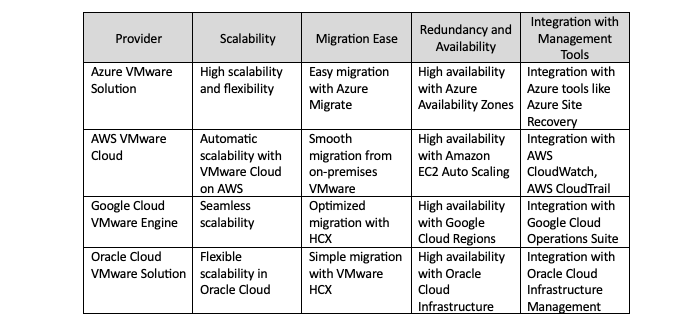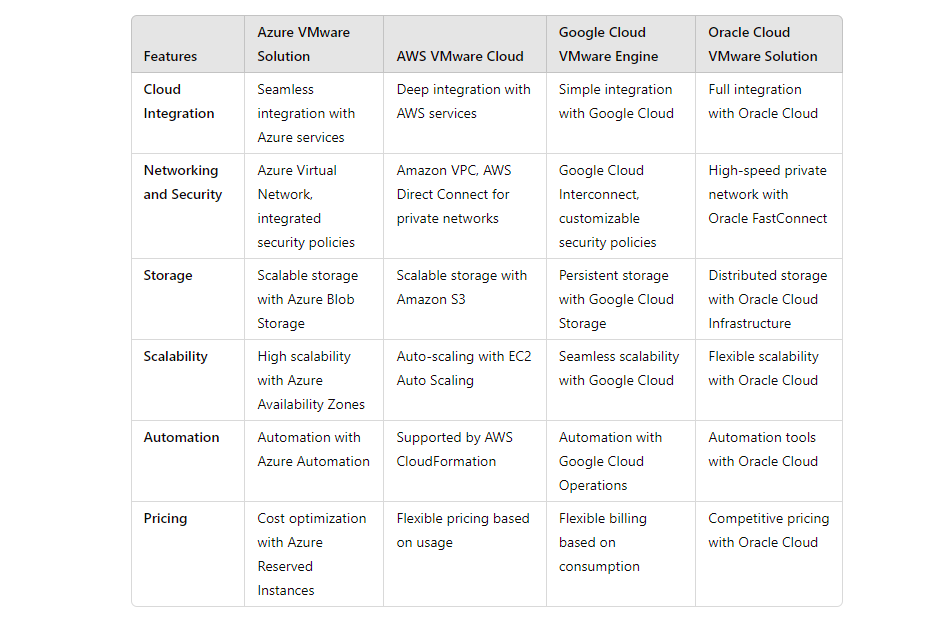
VMware on Cloud Comparisons - English
Virtualization is one of the most important technologies in the field of information technology (IT) as it has enabled companies to create more flexible, scalable, and efficient infrastructure environments. By allowing multiple virtual machines (VMs) to share the same physical resources, virtualization optimizes hardware usage, improves resource management capabilities, and reduces operational costs. VMware, being one of the leading players in this field, has extended its traditional virtualization platform to the cloud, offering a seamless transition for businesses that wish to move and run their VMware workloads in public cloud environments.
The rise of cloud adoption has significantly transformed the IT landscape, as it enables organizations to leverage infrastructure as a service (IaaS) without having to invest in expensive and complex hardware. In this context, companies of all sizes are seeking solutions that allow them to migrate their VMware environments to the cloud without compromising their existing infrastructure. To meet this demand, providers such as Microsoft Azure, Amazon Web Services (AWS), Google Cloud, and Oracle Cloud have developed specific solutions to run VMware in the cloud, allowing businesses to continue using their VMware environments and benefit from the advantages of public cloud infrastructure. These benefits include increased scalability, advanced security, operational flexibility, high availability, and the ability to integrate new technological solutions without the limitations of traditional physical data centers.
Each of these cloud providers has its own approaches and specific solutions for integrating VMware into their infrastructure, which results in significant differences in key areas such as integration with other cloud services, platform scalability, network and security capabilities, and the type of support they offer. While Azure VMware Solution stands out for its close integration with Microsoft tools, AWS VMware Cloud offers a highly scalable and flexible infrastructure ideal for large workloads. Google Cloud VMware Engine focuses on optimizing performance and integration with native Google Cloud solutions, while Oracle Cloud VMware Solution presents itself as an ideal option for businesses already using Oracle solutions and seeking infrastructure optimized for enterprise workloads.
Throughout this article, we will provide a detailed comparison of the four VMware cloud solutions, analyzing their features, benefits, and potential use cases, so that businesses can make informed decisions about which solution best fits their needs and strategic goals.
Benefits and Comparisons Between the 4 VMware Cloud Solutions
Each cloud provider’s VMware solution offers multiple benefits but varies in terms of integration with cloud infrastructure, additional features, scalability capabilities, and support. Below are two tables detailing the general and specific benefits of each solution.
General Benefits of VMware Cloud Solutions

Specific Benefits of VMware Cloud Solutions

Recommendation by Number of VMs and Each Cloud
The number of virtual machines (VMs) a company plans to manage can influence the choice of VMware cloud solution. Below is a table with recommendations for different numbers of VMs:

Here is a table comparing the key features of each solution:

Recommendation for Different Types of Businesses (Small, Medium, and Large)
- Small Businesses: Small businesses that need a VMware cloud solution can benefit from AWS VMware Cloud or Oracle Cloud VMware Solution. AWS offers pricing flexibility and easy access to cloud infrastructure, while Oracle may be a cost-effective option for businesses already using Oracle.
- Medium-Sized Businesses: Medium-sized businesses looking for strong integration with their existing solutions may benefit more from Azure VMware Solution or Google Cloud VMware Engine. Both solutions provide robust cloud infrastructure with seamless integration into their respective platforms.
- Large Businesses: For large organizations, AWS VMware Cloud is ideal as it offers extremely scalable infrastructure with a wide range of network and security options. Google Cloud VMware Engine is also an excellent option for global businesses already using Google Cloud.
Conclusions
Each cloud provider offers a VMware cloud solution tailored to different needs, and the platform choice depends on various factors such as scalability, integration with other services, pricing, and automation capabilities.
- Azure VMware Solution is ideal for businesses already using Microsoft as their primary platform.
- AWS VMware Cloud is perfect for companies that need a robust, scalable, and flexible solution.
- Google Cloud VMware Engine is an excellent option for businesses already within the Google Cloud ecosystem.
- Oracle Cloud VMware Solution is an attractive option for businesses already using Oracle Cloud or looking for a cost-effective and efficient solution to run VMware workloads.
When choosing the right solution, businesses should consider the size of their operations, existing infrastructure, and specific cloud requirements, such as security, compliance, and cost optimization.





